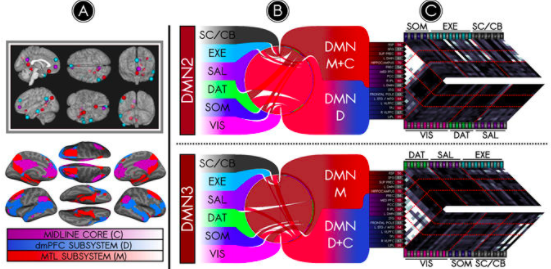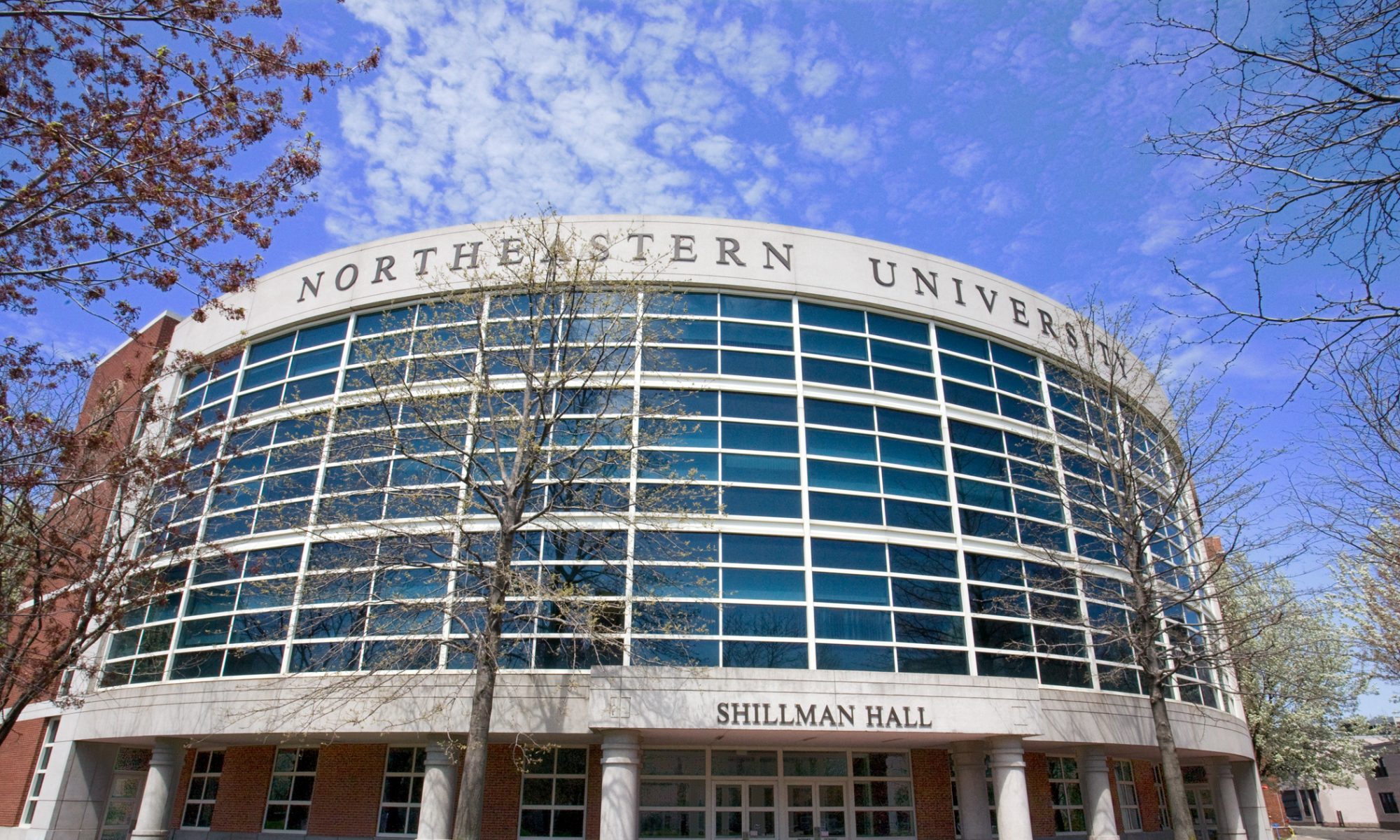Grad student, Alessia Iancarelli, was awarded a PsiChi Grant to study aggression!
12/8/2023
Alessia is studying how emotions influence attitudes toward punishment and aggression. While much research focusses on the psychological causes and consequences of aggression between perpetrators and targets, often overlooked is the crucial role of 3rd party observers (3POs), who can have direct influences on the parties involved (e.g., as jury members) or whose attitudes constitute whether and how society condones aggression and violence in general. Her work will examine whether, and in which situations, anger increases the degree to which people condone punishment toward others. Congrats Alessia!
New Paper – Fear-related psychophysiological patterns are situation and individual dependent: A Bayesian model comparison approach
August 25, 2023
Is there a universal mapping of physiology to emotion, or do these mappings vary substantially by person or situation? Psychologists, philosophers, and neuroscientists have debated this question for decades. Most previous studies have focused on differentiating emotions on the basis of accompanying autonomic responses using analytical approaches that often assume within-category homogeneity. In the present study, we took an alternative approach to this question. We determined the extent to which the relationship between subjective experience and autonomic reactivity generalizes across, or depends upon, the individual and situation for instances of a single emotion category, specifically, fear. Electrodermal activity and cardiac activity—two autonomic measures that are often assumed to show robust relationships with instances of fear—were recorded while participants reported fear experience in response to dozens of fear-evoking videos related to three distinct situations: spiders, heights, and social encounters. We formally translated assumptions from diverse theoretical models into a common framework for model comparison analyses. Results exceedingly favored a model that assumed situation-dependency in the relationship between fear experience and autonomic reactivity, with subject variance also significant but constrained by situation. Models that assumed generalization across situations and/or individuals performed much worse by comparison. These results call into question the assumption of generalizability of autonomic-subjective mappings across instances of fear, as required in translational research from nonhuman animals to humans, and advance a situated approach to understanding the autonomic correlates of fear experience.
Congratulations to Dr. Yiyu Wang!
July 6, 2023
Graduate student, Yiyu Wang, just completed her dissertation and earned her Ph.D.! She gave a public defense today on “Variability in Neural Representations of Fear: Insights from Computational Modeling”. Articles forthcoming!
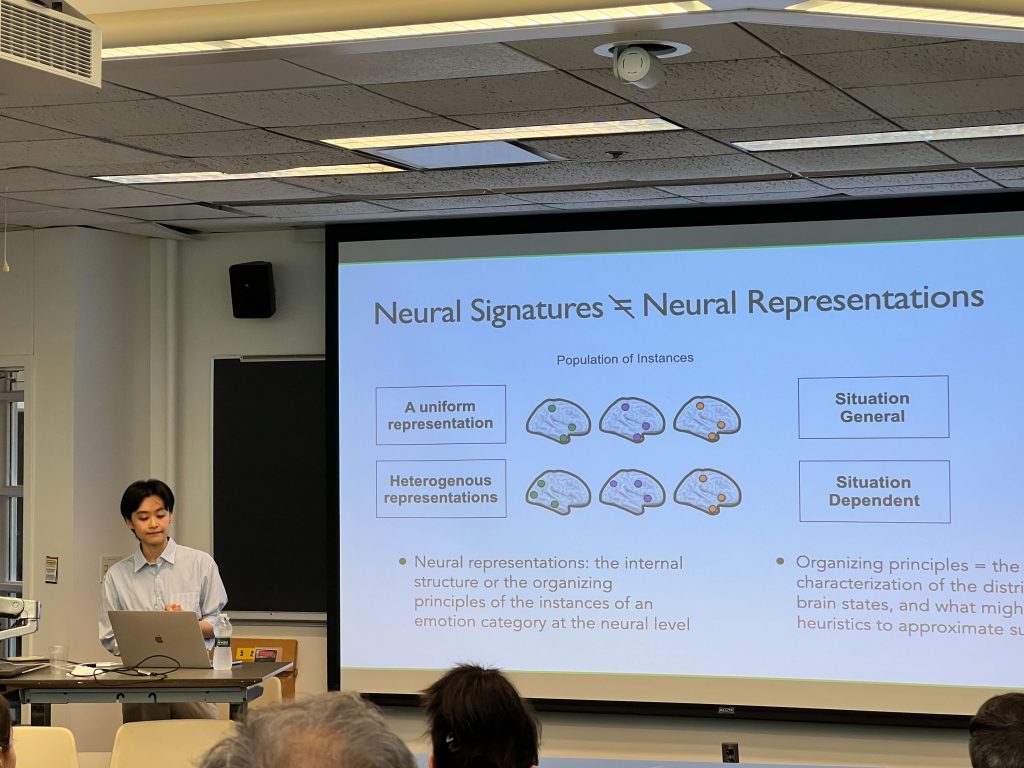
Welcome new lab members!
June 1, 2023
We are welcoming nine new members into the lab this summer! One undergraduate student as co-op, Kathie Yang, four undergraduate students as RAs, Teja Zeribi, Harper Stotland, Keerthana Karthik, and Mahiya Agarwal, and one master’s students as an RA, Dhanvi Patel. We are very excited to have them join the lab! For more individual information, check out our People page.
Congrats to Stephanie for going to Psych PhD program!
April 25, 2023
Congratulations to our lab manager Stephanie for getting into and accepting an offer from the Wayne State University Psychology PhD program! It has been incredible having you in the lab. You will be very missed when you leave in a couple months!

ABSLab at the Society for Affective Science conference!
April 19, 2023
The ABSLab fully represented at the annual Society for Affective Science conference this year in Long Beach, California! We had a great time learning and talking about research, presenting our own, and supporting and meeting with friends and collaborators.
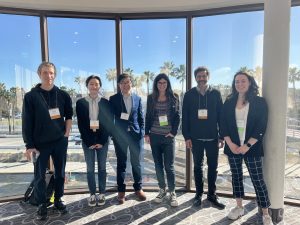
Left to right: Kieran McVeigh (grad student), Yiyu Wang (grad student), Kent Lee (postdoc), Alessia Iancarelli (grad student), Ajay Satpute (PI), Stephanie Fiedler (lab manager). Not pictured: Sophie Bailard (undergrad RA, previous co-op)

Left to right: Kieran McVeigh and Yiyu Wang, grad students
Poster title: Dynamic and static non-linear fMRI models have similar performance when predicting subjective fear from fMRI data
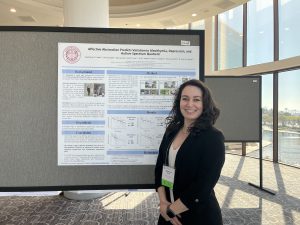
Pictured: Stephanie Fiedler, lab manager
Poster title: Affective abstraction predicts variation in alexithymia, depression, and autism spectrum quotient
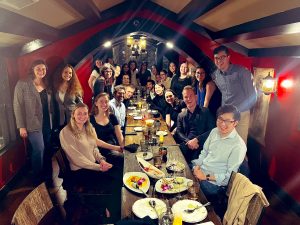
Dinner with collaborating labs: Erik Nook’s (Princeton), Kristen Lindquist’s (UNC Chapel Hill), Maria Gendron’s (Yale), Maital Neta’s (University of Nebraska–Lincoln), Elisa Baek’s (University of Southern California)
ABSLab at Northeastern RISE conference!
April 19, 2023
The ABSLab was represented with two posters at Northeastern’s RISE conference (Research and Creative Endeavor, Innovation, Scholarship, and Entrepreneurship Expo)!
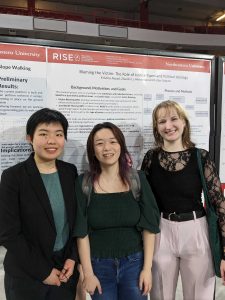
Left to right: Zhaolin Li, Julia Wong (lab friend), Kristina Abyad
Poster title: Blaming the victim – the role of justice types and political ideology
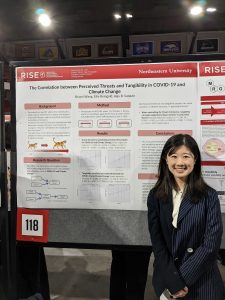
Pictured: Shiwei Wang
Poster title: Correlation between perceived threats and tangibility in COVID-19 and climate change
A great semester with PSYC 2991!
April 19, 2023
It’s been a great semester with the PSYC 2991 research methods course! We’ve learned how research is conducted behind the scenes and developed laboratory skills in human subjects research both in class and through working on projects in the lab. Projects ranged from working with neuroimaging methods and physiological measures to collecting behavioral data and subject visits.
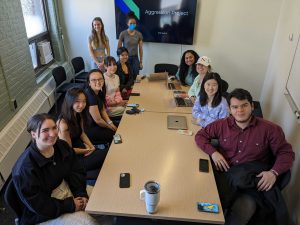
Left of table sitting front to back: Julia Apap, Bella Kim, Elizabeth Zhu, Ella Lesny, Manasvini Anjaria
Standing left to right: Taylor Wright, Erin Hanzlik
Right of table front to back: Miguel Torres Adame, Shiwei Wong, Valerie Foley, Esha Kidambi
Welcome new lab members!
January 4, 2023
We are welcoming 12 new members into the lab this summer! Twelve undergraduate students as RAs, Manasvini Anjaria, Esha Kidambi, Elizabeth Zhu, Ella Lesny, Julia Apap, Isabella (Bella) Kim, Valerie Foley, Shiwei Wang, Taylor Wright, Arianna Gaffney, Julia Edelhaus, Erin Hanzlik. We are very excited to have them join the lab! For more individual information, check out our People page.
Welcome new lab member!
June 24, 2022
We are very excited for Josh Rodriguez, a previous undergraduate research assistant, to continue in the lab as our new full-time research assistant! For more information about Josh, head over to our People page.

Citation network analysis paper covered by News@Northeastern!
April 27, 2022
Dr. Ajay Satpute and graduate student Alessia Iancarelli talk with News@Northeastern about the recently published citation network analysis paper and the difficulty keeping up with current literature.
Welcome new lab members!
April 25, 2022
We are welcoming nine new members into the lab this summer! One undergraduate student as co-op, Sophie Bailard, seven undergraduate students as RAs, Erin O’Neill, Katie Malloy, Max Garris, Jack Keith, Kristina Abyad, Seher Abbasi, Khanhdu Sara Ho, and one high school summer RA, Allie Guo. We are very excited to have them join the lab! For more individual information, check out our People page.
Congratulations Gabby, Helen, and Josh for winning awards!
April 25, 2022
Congratulations to Gabby Fernando-McKinley for receiving a Departmental Citizenship Award, to Zhaolin (Helen) Li for receiving a Departmental Scholarship Award, and to Josh Rodgriguez for receiving the Armington Award!
Congratulations graduating undergraduate research assistants!
April 25, 2022
Congratulations to our graduating undergraduate research assistants, Rasvitha (Rosie) Nandru, Zhaolin (Helen) Li, Gabriella Fernando-McKinley, Josh Rodgriguez, and Danielle Russo! It has been so great having you in the lab and we wish you the absolute best of luck in your future outside of Northeastern University!
New Paper – Using citation network analysis to enhance scholarship in psychological science: A case study of the human aggression literature
April 22, 2022
Researchers cannot keep up with the volume of articles being published each year. In order to develop adequate expertise in a given field of study, students and early career scientists must be strategic in what they decide to read. Here we propose using citation network analysis to characterize the literature topology of a given area. We used the human aggression literature as our example. Our citation network analysis identified 15 research communities on aggression. The five largest communities were: “media and video games”, “stress, traits and aggression”, “rumination and displaced aggression”, “role of testosterone”, and “social aggression”. We examined the growth of these research communities over time, and we used graph theoretic approaches to identify the most influential papers within each community and the “bridging” articles that linked distinct communities to one another. Finally, we also examined whether our citation network analysis would help mitigate gender bias relative to focusing on total citation counts. The percentage of articles with women first authors doubled when identifying influential articles by community structure versus citation count. Our approach of characterizing literature topologies using citation network analysis may provide a valuable resource for psychological scientists by outlining research communities and their growth over time, identifying influential papers within each community (including bridging papers), and providing opportunities to increase gender equity in the field.
New Paper – Sinful pleasures and pious woes? Using fMRI to examine evaluative and hedonic emotion knowledge
April 14, 2022
Traditionally, lust and pride have been considered pleasurable, yet sinful in the West. Conversely, guilt is often considered aversive, yet valuable. These emotions illustrate how evaluations about specific emotions and beliefs about their hedonic properties may often diverge. Evaluations about specific emotions may shape important aspects of emotional life (e.g., in emotion regulation, emotion experience, and acquisition of emotion concepts). Yet these evaluations are often understudied in affective neuroscience. Prior work in emotion regulation, affective experience, evaluation/attitudes, and decision-making point to anterior prefrontal areas as candidates for supporting evaluative emotion knowledge. Thus, we examined the brain areas associated with evaluative and hedonic emotion knowledge, with a focus on the anterior prefrontal cortex. Participants (N = 25) made evaluative and hedonic ratings about emotion knowledge during fMRI. We found that greater activity in the medial prefrontal cortex (mPFC), ventromedial PFC (vmPFC), and precuneus was associated with an evaluative (vs. hedonic) focus on emotion knowledge. Our results suggest that the mPFC and vmPFC, in particular, may play a role in evaluating discrete emotions.
New Paper – A computational neural model for mapping degenerative neural architectures
March 29, 2022
Degeneracy in biological systems refers to a many-to-one mapping between physical structures and their functional (including psychological) outcomes. Despite the ubiquity of the phenomenon, traditional analytical tools for modeling degeneracy in neuroscience are extremely limited. In this study, we generated synthetic datasets to describe three situations of degeneracy in fMRI data to demonstrate the limitations of the current univariate approach. We describe a novel computational approach for the analysis referred to as neural topographic factor analysis (NTFA). NTFA is designed to capture variations in neural activity across task conditions and participants. The advantage of this discovery-oriented approach is to reveal whether and how experimental trials and participants cluster into task conditions and participant groups. We applied NTFA on simulated data, revealing the appropriate degeneracy assumption in all three situations and demonstrating NTFA’s utility in uncovering degeneracy. Lastly, we discussed the importance of testing degeneracy in fMRI data and the implications of applying NTFA to do so.
Welcome new lab member!
March 28, 2022
We are welcoming a new member to the lab, an undergraduate student Ella Lanzaro! We are very excited to have her join the lab! For more individual information, check out our People page.
Welcome new lab members!
January 10, 2022
We are welcoming seven new members into the lab this semester! Two undergraduate students as co-ops, Krystal Qiao and Max Garcia, and five undergraduate students as RAs, Natalie Hackman, Lauren Maldonado, Nicole Groussis, Weslyn Cai, and Thirada Boonrawd. We are very excited to have them join the lab! For more individual information, check out our People page.
New Paper – Predictive processing models and affective neuroscience
October 1, 2021
Our postdoc Kent Lee and colleagues discuss the implications of predictive processing models for: (i) experimental design, (ii) reverse inference, and (iii) ecological validity, in cognitive and affective neuroscience.
Welcome new lab members!
September 9, 2021
We welcomed four new members into the lab this semester. Four undergraduate students, Paramjai Sandhu, Rosa Hamilton-Leak, Donnell Weldon, and Cassandra Stent-Torriani . We are very excited to have them join the lab! For more individual information, check out our People page.
Welcome new lab members!
July 6, 2021
We welcomed four new members into the lab this semester. Four undergraduate students, Serena Bejamin, Mariana Fonseca, Maria Harsvik, and Nasim Sheikhi. We are very excited to have them join the lab! For more individual information, check out our People page.
Welcome new lab member!
June 1, 2021
We welcomed our new post-doctorate, Rose Cooper, this month. We are very excited to have her join the lab! For more information about Rose, head over to our People page.

Now hiring a Research Technician!
May 11, 2021
The lab is currently hiring a Research Technician to work on an NSF-funded project with PIs Ajay Satpute and Lisa Feldman Barrett in the department of psychology. The project examines the behavioral, neural, and physiological correlates of affective processing. The position will involve human subjects recruitment for fMRI and peripheral physiology studies, data analysis, and general lab support. A BA/BS degree by the start date of the position is required. Prior experience conducting behavioral research is recommended. The start date is late summer (around 8/15/2021).
To apply, please use the online submission form: https://careersmanager.pageuppeople.com/879/ci/en-us/job/506290/research-technician.
Any informal inquiries with questions about the position can be directed to the lab email abslab.nu@gmail.com with a subject line that contains “Lab Technician”.
Now giving a Matlab Intro to Intermediate course!
May 11, 2021
Current graduate student Alessia Iancarelli is teaching a Matlab Intro to Intermediate course May – June to help those with minimal to no coding experience get their toes wet and gain a new skill! The course will remain small (15-20 people max), but if you’re interested, please email the lab email abslab.nu@gmail.com. If the course fills up, but there is still interest, she may be open to teaching the course again in August – September.
You can see the materials on the Lab Courses page under Resources!
Welcome new lab members!
May 10, 2021
We welcomed four new members into the lab this semester. Four undergraduate students, Jvalanti Prasad, Sacha Sergent, Briana Murphy, and Danielle Russo. We are very excited to have them join the lab! For more individual information, check out our People page.
Winner of Northeastern’s RISE People’s Choice Award!
May 2021
Congratulations to our grad student Alessia and her two undergraduate RAs Rosie and Yueting (Alex) for winning Northeastern’s Research, Innovation, Scholarship and Entrepreneurship Expo (RISE) People’s Choice Award for the most liked project in social sciences, businesses, and law! They presented on the role of a perpetrator’s outcome in victim blaming.
Nandru, Rasvitha, Lu, Yueting, Iancarelli, A. (2021) What Happened to the Perpetrator? The Role of Perpetrator’s Outcome in Victim Blaming. Abstract. Video presentation.
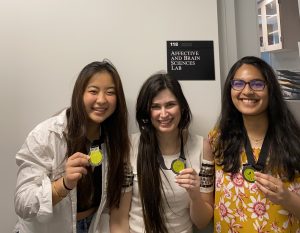
Check out the new section on our website, Lab Presentations!
April 16, 2021
We uploaded abstracts, posters, and video presentations from the last academic year (2020-2021)! Lab members have presented at the Society for Affective Science, Association for Psychological Science, New England Psychological Association, and more! To check them out, head over to our Lab Presentations page under Research.
New Paper – At the Neural Intersection Between Language and Emotion
March 22, 2021
What role does language play in emotion? Behavioral research shows that emotion words such as “anger” and “fear” alter emotion experience, but questions still remain about mechanism. Here, we review the neuroscience literature to examine whether neural processes associated with semantics are also involved in emotion.
Our review suggests that brain regions involved in the semantic processing of words: (i) are engaged during experiences of emotion, (ii) coordinate with brain regions involved in affect to create emotions, (iii) hold representational content for emotion, and (iv) may be necessary for constructing emotional experience. We relate these findings with respect to four theoretical relationships between language and emotion, which we refer to as “non-interactive,” “interactive,” “constitutive,” and “deterministic.
We conclude that findings are most consistent with the interactive and constitutive views with initial evidence suggestive of a constitutive view, in particular. We close with several future directions that may help test hypotheses of the constitutive view. Check out the full paper for more information.
New Paper – Neural Effects of Antidepressant Medication and Psychological Treatments: a Quantitative Synthesis Across Three Meta-Analyses
March 12, 2021
Check out this new article in the British Journal of Psychiatry! The study tested the convergence and divergence of antidepressant- and psychotherapy-evoked neural changes, and their overall with the brain’s affect network.
The researchers concluded that there are treatment-specific brain effects of both antidepressants and psychotherapy. Check out the full paper for more information.
New Paper – Comparing Supervised and Unsupervised Approaches to Emotion Categorization in the Human Brain, Body, and Subjective Experience
March 12, 2021
Check out this new article in Nature’s Scientific Reports journal! This study examines whether machine learning methods, which been a useful tool to map physical measurements to scientific categories, are suitable to investigate psychological categories, looked at in emotion science in this paper.
Using three emotion-based datasets, the researchers compare supervised (emotion labels) and unsupervised (no labels) to test this question. The study concludes with impressing the importance of questioning assumptions and the validity of using traditional labels when studying psychological categories. Check out the full paper here for more information.
Welcome new lab members!
January 2021
We welcomed four new members into the lab this semester. Four undergraduate students, Nihal Chaudhary, Rachel Feiner, Yueting Lu, and Alexandra Norce. We are very excited to have them join the lab! For more individual information, check out our People page.
Welcome new lab members!
October 2020
We welcomed two new members into the lab this semester. Two undergraduate students, Lauren Christenson and Abigail MacPherson. We are very excited to have them join the lab! For more individual information, check out our People page.
Welcome new lab member!
September 2020
We welcomed our new lab manager, Stephanie Fiedler, this semester. We are very excited to have her join the lab! For more information about Stephanie, head over to our People page.

Explaining the Panic around “Murder Hornets”
May 26, 2020
Lately, the news has been abuzz with concern about the appearance of Asian Giant Hornets, also known as “Murder Hornets,” in the US. However, murder hornets actually target bees, not humans. So why are people so afraid?
In this News at Northeastern article, Dr. Satpute explains the psychology at play. Linguistic cues in the news, contamination concerns primed by the COVID-19 pandemic, and fear of the unknown are among the factors contributing to the murder hornet panic.
Read the full article here for more information.
Lab Member Kent Lee Receives Fellowship Award!
May 19, 2020
Ivy attending NEU Masters in Counseling Psychology Program Next Year!
May 7, 2020
Current laboratory technician Ivy Chung has chosen to attend the Masters in Counseling Psychology at Northeastern University’s Bouvé college of Health Sciences. This will make Ivy the Lab’s first but hopefully not last double husky (two Northeastern degrees).

New Fall 2020 Graduate Student!
March 26, 2020
We are thrilled to announce that our current lab manager, Kieran McVeigh, will be coming back to the lab in Fall 2020 as a graduate student! We are very excited to continue working with Kieran in his new role. For more information about Kieran, head over to our People page.

New Paper – The Impact of Fear on Risk Taking
March 24, 2020
In psychological research, there is a general consensus that fear decreases risk taking. This belief influences politics, marketing, and even public health; but for years various studies have reported highly varying levels of this effect, or even a total absence of the effect.
In this paper, Sean Wake, our former lab manager, worked with Jolie Wormwood, PI of the Affective and Social Psychophysiology Lab at the University of New Hampshire, to conduct a meta-analysis using data from 50 papers, addressing a total of 136 effect sizes.
Ultimately, this research found that fear is related to decreased risk taking. However, the size of the fear’s effect on risk taking is highly variable across studies. Effect sizes are greater when studies use clinically anxious participants or when risk tasks involve tangible outcomes, but additional variance remains unexplained. Check out the full paper for more information.
New Paper – Ultra High Field fMRI of Human Superior Colliculi Activity during Affective Visual Processing, January 2020
February 12, 2020
Check out this new article in Nature’s Scientific Reports journal! Research was conducted by Candice Wang (now at Duke University for graduate school) for her senior thesis, and in collaboration with Dr. Bianciardi’s Brain Stem Imaging Lab at the Martinos Center.
The study utilized high-resolution fMRI scanning to examine activity in the superior colliculus while subjects viewed either neutral or aversive images. Aversive images elicited stronger activity in the superior colliculus, suggesting that the region contributes to the shaping of subjective emotional experience.
ABSLab Collaboration with MIND lab Featured in News At Northeastern
September 19, 2019
Check out the new article in News at Northeastern about our research examining Music Anhedonia.
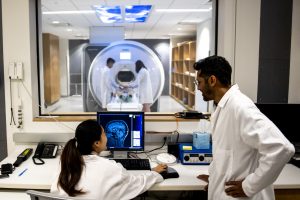
The Default Mode Network’s Role in
Discrete Emotion Accepted at Trends in Cognitive Science
August 16, 2019
Check out Dr. Satpute’s new article The Default Mode Network’s Role in Discrete Emotion (link) in the October Issue of Trends in Cognitive science. This article examines the default mode network’s role in emotional experience, reviewing neuro-imaging, lesion, and electrical stimulation studies, to suggest the default mode network is constitutive of discrete emotional experiences . Check out Box 1 from the article below describing how the default mode network helps map heterogenous experiences to the same emotion concept
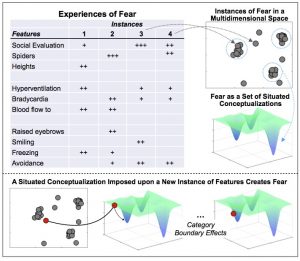
ABS Lab recruiting undergraduate Research Assistants for Fall of 2019
Here at the Affective and Brain Sciences lab we are looking for undergraduate research assistants. Undergraduate research assistants will learn about psychophysiology, neuroimaging, and behavioral analysis. Interested undergraduate students should email abslab.nu@gmail.com, with a brief introduction, a CV (or resume), and two professional references (include phone numbers and emails!).
Society for Affective Science!
March 2019
Our very own lab member, Yiyu Wang, was selected to give a flash talk for her poster being presented at the 2019 Society of Affective Science Convention. Check out her article below!
Wang, Y., Boatman, G., & Satpute, A. B. (2019). Different varieties of fear engage distinct distributed neural activation patterns. Society for Affective Science Conference Abstracts
Welcome new lab members!
January 2019
We welcomed four new members into the lab this semester. A lab manager, Kieran McVeigh, a post-doctorate, Kent Lee, and two undergraduate students, Alia Newman-Boulle and Maya Sundel. We are very excited to have them join the lab! For more individual information, check out our People page.
Night at the Discovery Science Museum
December 2018
The ABS Lab took part in the Meet the Scientists & Engineers. The event was held at the Discovery Science Museum in Acton, MA. The event was in partnership with NSF funded Pacific Science Center Portal to the Public Network. We presented on the psychology and neuroscience of fear to adults and children attendees for one evening.


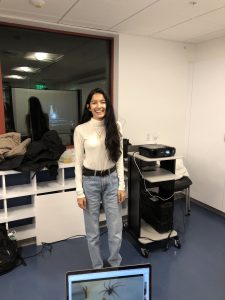

Welcome new lab members!
September 2018
We welcomed three new members into the lab this semester. A graduate student, Yiyu Wang, and two undergraduate students, Aditi Lohe and Carmen Bango. We are very excited to have them join the lab! For more individual information, check out our People page.
ABS Lab receives funding from NCI
August 2018
The ABS Lab received a $3,400,000 grant from the National Cancer Institute to study fundamental subcortical mechanisms in affective processing.
Deconstructing arousal into wakeful, autonomic and affective varieties
January 31, 2018
In this article, we review neuroscience findings for three of the most common origins of arousal: wakeful arousal, autonomic arousal, and affective arousal. Our review makes two overarching points. First, research conducted primarily in non-human animals underscores the importance of several subcortical nuclei that contribute to various sources of arousal, motivating the need for an integrative framework. We outline an integrative neural reference space as a key first step in developing a more systematic understanding of central nervous system contributions to arousal. Second, there is a translational gap between research on non-human animals, which emphasizes subcortical nuclei, and research on humans using non-invasive neuroimaging techniques, which focuses more on gross anatomical characterizations of cortical (e.g. network architectures including the default mode network) and subcortical structures. We forecast the importance of high-field neuroimaging in bridging this gap to examine how the various networks within the neural reference space for arousal operate across varieties of arousal-related phenomena.
Historical Pitfalls in Emotion Research
November 1, 2017
In this article, we offer a brief history summarizing the last century of neuroscientific study of emotion, highlighting dominant themes that run through various schools of thought. We then summarize the current state of the field, followed by six key points for scientific progress that are inspired by a multi-level constructivist theory of emotion
Barrett LF, Satpute AB (2017) Historical pitfalls and new directions in the neuroscience of emotion.
ABS Lab receives funding from NSF
August 2017
The ABS Lab received a $999,000 grant from the National Science Foundation to study the neural bases of subjective experience through probabilistic models.
Contextual Connectivity
July 26, 2017
Investigations of the human brain’s connectomic architecture have produced two alternative models: one describes the brain’s spatial structure in terms of static localized networks, and the other describes the brain’s temporal structure in terms of dynamic whole-brain states. Here, we used tools from connectivity dynamics to develop a synthesis that bridges these models. Using resting fMRI data, we investigated the assumptions undergirding current models of the human connectome. Consistent with state-based models, our results suggest that static localized networks are superordinate approximations of underlying dynamic states. Furthermore, each of these localized, dynamic connectivity states is associated with global changes in the whole-brain functional connectome. By nesting localized dynamic connectivity states within their whole-brain contexts, we demonstrate the relative temporal independence of brain networks. Our assay for functional autonomy of coordinated neural systems is broadly applicable, and our findings provide evidence of structure in temporal state dynamics that complements the well-described static spatial organization of the brain.
